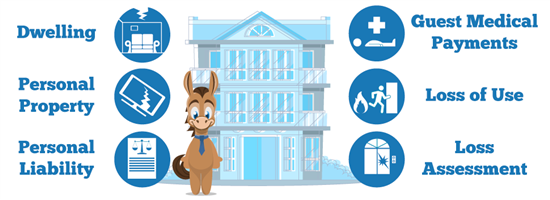HO6 Insurance
HO-6 insurance provides coverage for condo owners. But what exactly does it cover? And how much can you expect to pay? Read on to learn all you need to know about HO-6 insurance.
 |
| © CreditDonkey |
You've worked hard to buy a condo, so you want to protect every part of it.
HO-6 insurance covers everything from the walls in, including your belongings. It DOESN'T cover the outside of your condo. Your HOA's master policy takes care of the exterior and common areas.
Learn more about the differences and what your HO-6 policy will really cover.
What Is HO-6 Insurance?
HO-6 insurance is another term for condo insurance. It's a type of homeowners insurance that covers individuals who own a condo unit in a condominium building. Condo insurance covers your personal belongings and personal liability concerns.
It's easy to think you don't need more insurance, but that's a big mistake. Read on to learn why you'll want to make this a priority.
HO-6 policies are also known as walls-in coverage. Think of an individual unit as everything from the outer walls going inward.
Your condo or homeowners association provides coverage for the exterior and common areas of the entire condo building. This is called the master policy.
Your HO-6 insurance works together with a master policy to cover your condo.
Although there's no law that says you have to have condo insurance, lenders require it as part of their terms. Even if you're the condo owner, it's a good idea to get condo insurance to protect your assets.
Why Do I Need Condo Insurance?
If something happens to your condo or belongings, condo insurance helps pay for the loss. Out-of-pocket costs for repairs could reach hundreds of thousands of dollars.
As exciting as it is to get a place of your own, it's common to forget how even little repairs seem to add up to one, big expensive bill. Why take the risk of wiping out your savings account?
Condo insurance will:
- Fill coverage gaps in your condo association master insurance policy
- Protect your condo interior and personal property
- Secure your assets with personal liability coverage
- Pay for living expenses if you can't stay in your condo due to damage or evacuation
- Meet the condo insurance requirement of your mortgage lender or condo association
HO-6 insurance is for condos, while HO-3 insurance is for townhouses. Although condominiums and townhouses or townhomes look alike, they require different insurance policies.
How Much Does Condo Insurance Cost?
Condo owners pay an average of $500 for condo insurance. However, coverage can cost anywhere between $250–$1,500 per year. The exact cost depends on:
- Coverage limits
- Deductible
- Location
- Age of condo building
- What the building is made of
Insurance companies use these factors to see how risky it would be to insure your condo. The lower the risk of damages, the lower the cost will be.
What Does HO-6 Insurance Cover?
 |
| © CreditDonkey |
HO-6 insurance protects you and your property from a variety of damages. A condo insurance policy typically includes six main types of coverage:
- Dwelling (covers structural elements of your condo)
- Personal property (covers your belongings)
- Personal liability (if someone files a claim or lawsuit against you)
- Guest medical payments (if a guest gets hurt in your condo)
- Loss of use (covers living expenses if condo is unlivable due to damage or evacuation)
- Loss assessment (covers damages to common areas that exceed master policy limits)
We get it. You're thinking about how you want to decorate, not all of this. It's easy to get caught up in the fun stuff. But it's important to focus on the less exciting things like protecting your property. It's one of those expenses nobody wants to put out, but are glad they made the investment when they need it.
If the limits on your condo policy aren't enough for your lifestyle, you can buy additional coverage. This is referred to as an endorsement, floater, or rider.
For example, you can add a personal property damage endorsement if you own expensive jewelry that wouldn't be covered by your standard policy.
Perils Covered by Condo Insurance
Condo insurance policies also cover specific "perils", a term that insurance companies use to describe risks or disasters.
Condo insurance is available either as a "named peril" or "open peril" policy.
Named peril policies only provide coverage for hazards that are mentioned in the policy. This usually includes fire, explosions, theft, etc. Open peril policies cover everything except the hazards mentioned in the policy.
Named perils usually include:
- Fire
- Smoke
- Explosions
- Volcanic eruption
- Windstorm or hail
- Weight of ice, sleet, or snow
- Freezing
- Accidental overflow or discharge of water or steam
- Accidental and sudden cracking, burning, tearing apart, or bulging
- Theft
- Vandalism
- Riot
- Damage caused by falling object
- Damage caused by vehicles
- Damage caused by aircraft
- Accidental and sudden damage from an electrical surge
HO-6 policies usually don't cover flood and earthquake damage. But you can buy separate flood and earthquake policies for your condo.
Be sure to ask your insurance company or agent to specify what you need to do to add these, or if they are needed in your area. Sometimes it comes down to the certain zones that you live in. For example, a low-lying coastal home might be in a flood zone.
How Policies Pay for Damaged Items
When buying an HO-6 policy, you'll also have to decide how you want the insurance company to cover the cost of damaged items. There are three main coverage types to choose from:
- Actual cash value (pays the value of the loss minus depreciation)
- Replacement cost (pays for the loss at today's market prices)
- Guaranteed or extended replacement cost (pays for the loss at today's market prices, even if the cost exceeds the policy's limits)
What Doesn't HO-6 Insurance Cover?
Condo insurance does not cover damage caused by:
- Wear and tear
- Inadequate preventive maintenance
- Rodents, insects, pests, and birds
- Earthquakes
- Floods
- Sinkholes
- Mudslides
- Nuclear hazards
- Intentional injuries to others
- Sewer/drain backups or sump pump overflow
Coverage for some of these exclusions is available by purchasing an endorsement to a condo policy.
How Much Condo Insurance Do I Need?
Before deciding how much insurance to buy, see if your condo association master policy covers any part of your unit.
Master policies typically offer one of these types of protection:
Bare Walls Coverage
Covers only the exterior structure of the building, including common areas, and other property owned by the condo association.
Single Entity Coverage
Covers the building's structure, common areas, and permanent fixtures in your condo unit.
All-In Coverage
Covers the exterior structure of the building, the structural interior, and fixtures of each condo unit. Any upgrades you did to your unit are also covered.
The amount of insurance coverage you need will depend on your lifestyle. But you can use the following as a guideline:
- Dwelling - 20% of the condo's purchase price or $250,000, whichever is less
- Personal property - 50% to 70% of your dwelling coverage
- Personal liability - Should match your net worth, typically $100,000 to $500,000
- Guest medical payments - Purchase the maximum limit allowed, usually $5,000 per incident
- Loss of use - Should cover daily expenses, including cost of renting items
- Loss assessment - $25,000 to $50,000 depending on your master policy limits
Coverage Through the Condo Association
Sometimes, condo associations offer insurance to unit owners for an additional cost added to the association's monthly or yearly fees. It is essentially an extension of the master insurance policy.
If this is the case, check whether the policy:
- Includes all 6 coverages
- Provides enough coverage for their needs
- Offers affordable deductibles
- Is in line with the cost of condo insurance
How Can I Save on HO-6 Insurance?
Major cost savings can be found in discounts offered by insurers. Read on to learn how to get some easy discounts:
Install Security Features
These include window locks, deadbolts on exterior doors, and an electronic security system connected to your local police department.
Install Fire Prevention Features
Smoke detectors, automatic sprinkler systems, fire extinguishers, and a fire alarm connected to your local fire department can help lower your insurance rates.
Quit Smoking
A discounted rate is available if everyone living in your unit hasn't smoked in the past two years.
Bundle Your Insurance Policies
Most insurers offer a multi-policy discount if you have more than 1 policy with them.
How to Buy Condo Insurance
 |
| © CreditDonkey |
Before you choose an insurance company, research your options to make sure you're getting the best deals and service:
- Check their financial stability on insurance rating agencies like AM Best and Standard & Poor's.
- Read customer review sites and the Better Business Bureau.
- Look for all available discounts and see if you qualify.
You can get a condo insurance policy online, by phone, or in person. Buying online from an insurance marketplace is the fastest way to get condo insurance.
If you prefer to buy in person, you'll have three types of insurance agents to choose from:
- Captive agents (work for one insurance company)
- Independent agents (sell insurance for multiple companies)
- Insurance brokers (work for you and sends insurance applications on your behalf)
Going with an independent agent or a broker will let you easily compare quotes from different insurance providers. But if you're looking to bundle your insurance, a captive agent can help you the best deal.
Bottom Line
 |
| © CreditDonkey |
Condo insurance protects your condo by filling the gaps in your condo association master insurance policy.
Before buying condo insurance, know what your master policy provides. From there, you can purchase only the coverages you need.
Write to Maryellen Cicione at feedback@creditdonkey.com. Follow us on Twitter and Facebook for our latest posts.
Read Next:
